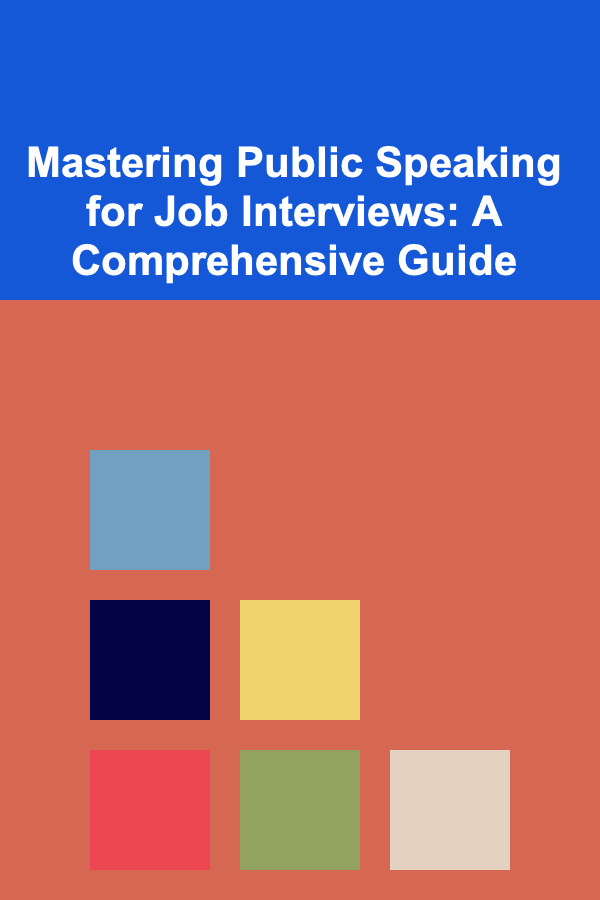
Mastering Public Speaking for Job Interviews: A Comprehensive Guide
ebook include PDF & Audio bundle (Micro Guide)
$12.99$10.99
Limited Time Offer! Order within the next:

Job interviews, in their essence, are public speaking engagements. While not performed on a stage in front of hundreds, they demand the same core skills: clear communication, compelling delivery, and the ability to connect with your audience (the interviewer). Many candidates, despite possessing the necessary skills and experience, falter during interviews due to anxiety and poor public speaking skills. This article provides a comprehensive guide to mastering public speaking techniques specifically tailored for job interviews, enabling you to confidently articulate your qualifications and make a lasting positive impression.
Understanding the Interview as a Public Speaking Opportunity
Before diving into specific techniques, it's crucial to reframe your perspective on job interviews. Instead of viewing them as stressful interrogations, consider them opportunities to showcase your skills and personality. Think of it as presenting a compelling narrative -- your career story -- to a specific audience. This mindset shift alone can significantly reduce anxiety and improve your overall performance.
Here's why understanding the public speaking aspect of interviews is paramount:
- First Impressions Matter: The first few minutes of an interview are critical. Your initial greeting, body language, and opening remarks set the tone for the entire conversation. Confidence and clarity in these moments can instantly elevate your perceived value.
- Communication Skills are Highly Valued: Regardless of the specific role, employers consistently rank communication skills as essential. A well-spoken candidate demonstrates their ability to articulate ideas, collaborate effectively, and represent the company professionally.
- Storytelling is Key: Interview questions often require you to narrate your experiences and achievements. Effective storytelling, with a clear beginning, middle, and end, keeps the interviewer engaged and makes your responses memorable.
- Anxiety Management is Crucial: Interview anxiety can manifest in various ways, including rapid speech, fidgeting, and difficulty articulating thoughts. Public speaking techniques, such as breathing exercises and visualization, can help manage this anxiety and improve your composure.
Preparation is Paramount: Laying the Foundation for Success
Just as a successful public speaker meticulously prepares their presentation, you must rigorously prepare for your interview. This preparation encompasses understanding the company, the role, and crafting compelling answers to common interview questions.
1. Researching the Company and the Role
Thorough research demonstrates your genuine interest and allows you to tailor your responses to the specific needs of the organization.
- Company Website: Explore the company's mission, values, products/services, recent news, and organizational structure.
- LinkedIn: Research the interviewer's background and connect with current employees to gain insights into the company culture.
- Glassdoor: Read employee reviews to understand the company's strengths and weaknesses. Pay attention to comments about the interview process.
- Job Description: Carefully analyze the job description, identifying the key skills and qualifications required. Highlight instances in your experience where you've demonstrated these attributes.
- Industry News: Stay informed about the latest trends and challenges in the company's industry. This demonstrates your proactive interest and ability to think critically.
2. Mastering the STAR Method for Storytelling
The STAR method (Situation, Task, Action, Result) provides a structured framework for answering behavioral interview questions, which often begin with phrases like "Tell me about a time when..." or "Describe a situation where..."
- Situation: Briefly describe the context or scenario you were in.
- Task: Explain the specific task or challenge you faced.
- Action: Detail the actions you took to address the task or challenge. Focus on your contributions.
- Result: Quantify the positive outcomes of your actions. Use numbers and metrics whenever possible.
Example:
Question: Tell me about a time you had to deal with a difficult client.
STAR Response:
- Situation: "I was working as a customer service representative at XYZ Company, and we had a client who was consistently dissatisfied with our services. He would frequently call and complain, often using harsh language."
- Task: "My task was to resolve his concerns, retain him as a client, and improve his overall satisfaction with our company."
- Action: "I took several steps to address his concerns. First, I actively listened to his complaints without interruption, demonstrating empathy and understanding. Then, I investigated the root causes of his dissatisfaction and identified areas where we could improve our service. I proactively communicated updates to him throughout the process. Finally, I offered him a discount on his next invoice as a gesture of goodwill."
- Result: "As a result of my efforts, the client's satisfaction significantly improved. He became a loyal customer and even recommended our services to other businesses. We were able to retain his account, which generated approximately $10,000 in annual revenue for the company."
3. Anticipating and Practicing Common Interview Questions
Prepare answers to frequently asked interview questions, but avoid memorizing them verbatim. Focus on understanding the underlying intention of each question and crafting natural, conversational responses.
Common Interview Questions:
- Tell me about yourself.
- Why are you interested in this role?
- Why are you interested in our company?
- What are your strengths and weaknesses?
- Where do you see yourself in 5 years?
- Tell me about a time you failed.
- Tell me about a time you succeeded.
- Describe a challenging situation you overcame.
- What are your salary expectations?
- Do you have any questions for me?
Tips for Practicing:
- Record Yourself: Video recording allows you to analyze your body language, tone of voice, and pacing.
- Practice in Front of a Mirror: Observe your facial expressions and posture.
- Mock Interviews: Ask a friend, family member, or career counselor to conduct a mock interview and provide feedback.
- Focus on Clarity and Conciseness: Avoid rambling or using jargon. Get straight to the point and provide specific examples.
Mastering Delivery: The Art of Confident Communication
Delivery is just as important as content. Even the most well-prepared answers can fall flat if delivered poorly. Focus on these key aspects of delivery to create a positive and impactful impression.
1. Body Language: Projecting Confidence and Engagement
Nonverbal communication accounts for a significant portion of how your message is received. Be mindful of your body language and use it to your advantage.
- Eye Contact: Maintain consistent eye contact with the interviewer to demonstrate confidence and engagement. Avoid staring intensely or darting your eyes around the room.
- Posture: Sit upright with your shoulders back, conveying confidence and professionalism. Avoid slouching or fidgeting.
- Facial Expressions: Smile genuinely and use appropriate facial expressions to reflect your enthusiasm and engagement.
- Hand Gestures: Use natural hand gestures to emphasize your points and add dynamism to your delivery. Avoid excessive fidgeting or distracting movements.
- Mirroring: Subtly mirroring the interviewer's body language can build rapport and create a sense of connection.
2. Voice Modulation: Creating a Captivating Tone
Your voice is a powerful tool. Use it effectively to maintain the interviewer's attention and convey your enthusiasm.
- Pace: Speak at a moderate pace, allowing the interviewer to easily understand your words. Avoid speaking too quickly, which can make you appear nervous, or too slowly, which can make you seem unenthusiastic.
- Volume: Speak clearly and audibly, ensuring the interviewer can hear you without straining. Adjust your volume based on the room and the interviewer's proximity.
- Tone: Vary your tone to avoid sounding monotonous. Use inflection to emphasize key points and convey your enthusiasm.
- Pauses: Strategic pauses can add emphasis and allow the interviewer time to process your words. Avoid using filler words like "um" or "uh."
- Enunciation: Practice clear enunciation to ensure that your words are easily understood. Record yourself and listen back, paying close attention to how you pronounce each word.
3. Handling Nervousness: Strategies for Staying Calm and Composed
It's perfectly normal to feel nervous during a job interview. The key is to manage your anxiety and prevent it from negatively impacting your performance.
- Deep Breathing Exercises: Practice deep breathing exercises before and during the interview to calm your nerves. Inhale deeply through your nose, hold for a few seconds, and exhale slowly through your mouth.
- Visualization: Visualize yourself succeeding in the interview. Imagine yourself confidently answering questions and making a positive impression.
- Positive Self-Talk: Replace negative thoughts with positive affirmations. Remind yourself of your strengths and accomplishments.
- Preparation is Key: The more prepared you are, the more confident you will feel.
- Acknowledge Your Nervousness (If Necessary): If you're feeling particularly anxious, it can be helpful to acknowledge it briefly. For example, you could say, "I'm a little nervous, but I'm excited to be here." This shows self-awareness and can help break the ice.
- Focus on the Conversation: Instead of dwelling on your anxiety, focus on engaging in a meaningful conversation with the interviewer.
Crafting a Compelling Narrative: Storytelling for Impact
Interviews are ultimately about telling a story -- your career story. The more compelling and memorable your story, the more likely you are to land the job.
1. Identifying Your Key Selling Points
Before the interview, identify your key selling points -- the skills, experiences, and qualities that make you a strong candidate for the role. These should align with the requirements outlined in the job description.
- Skills: Technical skills, soft skills (communication, teamwork, problem-solving), and industry-specific knowledge.
- Experiences: Relevant work experience, projects, internships, and volunteer activities.
- Qualities: Personality traits that make you a good fit for the company culture (e.g., adaptable, results-oriented, creative).
2. Weaving Your Selling Points into Your Answers
Don't simply list your skills and experiences. Instead, weave them into your answers in a way that demonstrates their value to the company.
Example:
Question: Why are you a good fit for this role?
Answer: "I believe I'm a strong fit for this role for several reasons. First, my experience in [relevant industry] has given me a deep understanding of [key industry trends]. Second, my skills in [relevant skills] align perfectly with the requirements outlined in the job description. For example, in my previous role at [previous company], I used [skill] to [achieve specific result]. Finally, I'm a highly [positive quality] and I'm confident that I can quickly contribute to the team's success."
3. Using Anecdotes to Illustrate Your Abilities
Anecdotes -- brief, engaging stories -- can make your answers more memorable and illustrate your abilities in a concrete way. Use the STAR method (Situation, Task, Action, Result) to structure your anecdotes.
Example:
Question: Tell me about a time you had to work under pressure.
Answer: "At my previous company, we were launching a new product and were facing a tight deadline. [Situation] The marketing team was responsible for creating all of the marketing materials, but we were short-staffed and behind schedule. [Task] My task was to manage the project, delegate tasks effectively, and ensure that we met the deadline. [Action] I worked closely with the team to prioritize tasks, identify potential bottlenecks, and reallocate resources as needed. I also worked extended hours to help complete some of the tasks myself. [Result] As a result of our efforts, we were able to launch the product on time and within budget. The product was a success, and we exceeded our sales targets for the first quarter."
Handling Difficult Questions: Turning Challenges into Opportunities
Some interview questions are designed to be challenging or uncomfortable. These questions are not meant to trick you, but rather to assess your critical thinking skills, problem-solving abilities, and composure under pressure.
1. Addressing Weaknesses Honestly and Positively
When asked about your weaknesses, avoid clichés like "I'm a perfectionist." Instead, choose a genuine weakness and explain how you are working to improve it.
Example:
"One area I'm actively working on is my public speaking skills. While I'm comfortable presenting to small groups, I sometimes get nervous when speaking in front of larger audiences. To address this, I've joined a Toastmasters club and I'm actively seeking opportunities to present at company meetings. I've already seen significant improvement in my confidence and delivery."
2. Explaining Gaps in Your Employment History
If you have gaps in your employment history, be honest and upfront about them. Explain the circumstances surrounding the gap and highlight any skills or experiences you gained during that time.
Example:
"I took a year off from work to care for my ailing parent. During that time, I developed strong organizational and time management skills, and I also learned a lot about patience and empathy. I'm now eager to return to the workforce and apply my skills to a new challenge."
3. Asking Thoughtful Questions: Demonstrating Your Engagement
Asking thoughtful questions at the end of the interview demonstrates your engagement and genuine interest in the role. Prepare a list of questions beforehand, but also be prepared to ask follow-up questions based on the conversation.
Examples of Good Questions:
- What are the biggest challenges facing the company/team right now?
- What are the opportunities for growth and development in this role?
- What does a typical day/week look like in this position?
- How would you describe the company culture?
- What are the next steps in the interview process?
Post-Interview Follow-Up: Reinforcing Your Interest
The interview process doesn't end when you leave the room. A thoughtful follow-up can reinforce your interest and solidify your candidacy.
1. Sending a Thank-You Note
Send a personalized thank-you note to each interviewer within 24 hours of the interview. Express your gratitude for their time, reiterate your interest in the role, and highlight something specific you discussed during the interview.
Example:
Dear [Interviewer Name],
Thank you for taking the time to speak with me yesterday about the [Job Title] position at [Company Name]. I enjoyed learning more about [specific topic discussed] and I'm even more excited about the opportunity to contribute to your team.
My skills and experience in [relevant skills] align well with the requirements of the role, and I'm confident that I can make a significant contribution to [Company Name].
Thank you again for your consideration. I look forward to hearing from you soon.
Sincerely,
[Your Name]
2. Following Up on Your Application
If you haven't heard back from the company within the timeframe they provided, it's appropriate to follow up on your application. Express your continued interest in the role and inquire about the status of the hiring process.
Conclusion: Turning Interviews into Triumphs
Mastering public speaking for job interviews is a continuous process of preparation, practice, and self-reflection. By understanding the interview as a public speaking opportunity, focusing on clear communication and compelling delivery, and managing your anxiety, you can significantly increase your chances of success. Remember to embrace the opportunity to tell your story, showcase your skills, and connect with the interviewer on a personal level. With dedication and persistence, you can transform job interviews from daunting challenges into triumphant milestones in your career journey.

Gerontology: Understanding Aging and Its Implications for Health and Society
Read More
How to Add Luxury Features to Your Home Renovation
Read More
How to Invest Wisely for Beginners Without Taking Too Many Risks
Read More
How to Perform Regular Home Inspections to Catch Problems Early
Read More
How to Utilize Loyalty Programs for Small Business
Read More
How to Socialize Your Puppy: A Training Checklist for a Well-Adjusted Dog
Read MoreOther Products

Gerontology: Understanding Aging and Its Implications for Health and Society
Read More
How to Add Luxury Features to Your Home Renovation
Read More
How to Invest Wisely for Beginners Without Taking Too Many Risks
Read More
How to Perform Regular Home Inspections to Catch Problems Early
Read More
How to Utilize Loyalty Programs for Small Business
Read More